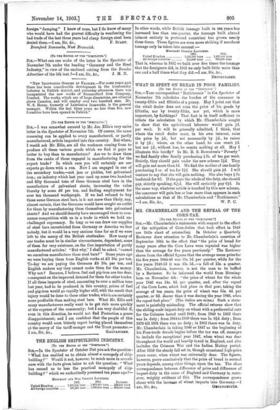[TO THE EDITOR OP THE "SPECTATOR.")
was somewhat amused by Mr. Jos. Ellis's very naïve letter in the Spectator of November 7th. Of course, the same reasoning can be applied to every manufactured, or partly manufactured, article imported into this country. But where, I would ask Mr. Ellis, are all the workmen coming from to produce all these various goods which we find it pays us better to buy than to manufacture? Are we to draw them from the ranks of those engaged in manufacturing for the export trade P In which case you will certainly see our exports go down with a run. Now I am engaged in one of the secondary trades,—not jam or pickles, but galvanised iron; an industry which last year used up some two hundred and fifty thousand tons of these German steel bars in the manufacture of galvanised sheets, increasing tho value thereby by some £6 per ton, and finding employment for over ten thousand workpeople. If we had refused to buy these same German steel bars, is it not more than likely, nay, almost certain, that the Germans would have sought an outlet for them by manufacturing them themselves into galvanised sheets P And we should thereby have encouraged them to com- mence competition with us in a trade in which we hold un- challenged supremacy. So long as we can draw our supplies of steel bars unrestricted from Germany or America we fear nobody, but it would be a very anxious time for us if we were left to the mercy of the British steelmaker. How many of our trades must be in similar circumstances, dependent, some of them for very existence, on the free importation of partly manufactured articles! "But why," I shall be asked, "cannot we ourselves manufacture these steel bars?" Some years ago we were buying them from English works at £3 10s. per ton. To-day we are paying the Germans £4 .10s. per ton, and English makers say they cannot make them for the money. Why not ? Because, I believe, fuel and pig-iron are too dear, consequent on the improved demand for them for other trades. If all these imports of steel, amounting to over a million tons last year, had to be produced in this country, prices of fuel and pig-iron would go rapidly higher still, with the result that injury would be done to these other trades, which are certainly more profitable than making steel bars. What Mr. Ellis and many manufacturers really want is to get rich more quickly at the expense of the community; but I am very doubtful if, even in this direction, he would not find Protection a grave disappointment; and I am confident that the people of this country would soon bitterly regret having placed themselves at the mercy of the tariff-monger and the Trust promoter.—














































 Previous page
Previous page